
Amid signs of a looming debt crisis in Europe, Bloomberg.com reports on June 5th that the continent may avoid a recession altogether:
Powered by savings amassed during two years of coronavirus curbs, Europe’s consumers aren’t yet letting record inflation get in the way of a spending binge that’s underpinning the continent’s pandemic recovery.
Bloomberg cites data indicating that European consumers have increased their spending on “eating out and vacations” strongly enough to “offset manufacturing weakness.” While reporting no numbers, Bloomberg suggests that consumers “sitting on 700 billion-euro ($753 billion) cash” is reason enough to predict macroeconomic resiliency in Europe.
The Bloomberg report is contradicted by findings by Eurostat on retail trade in the euro area and the EU as a whole:
In April 2022, the seasonally adjusted volume of retail trade decreased by 1.3% both in the euro area and in the EU compared with March 2022 … In March 2022, the retail trade volume increased by 0.3% in the euro area and by 0.6% in the EU.
Eurostat also notes that adjusted for inflation, retail sales for food, drinks, and tobacco decreased by 2.6% month-to-month in the euro area and by 2.3% in the EU as a whole. For non-food products, the corresponding numbers were -0.7% and -0.9%, respectively.
Raw data on consumer spending, also published by Eurostat, reinforce the retail numbers. While consumer spending seasonally declines in the first quarter of the new year compared to the last quarter of the previous year, the decline in most EU member states was stronger in 2022 than in previous years (not counting the pandemic).
In 16 of the 23 EU states for which Eurostat reports data, inflation-adjusted consumer spending declined more sharply in the first quarter of 2022 than the average for the same quarter in 2014-2019. In four countries, Denmark, Ireland, Italy, and Spain, the decline was at least twice the pre-pandemic average.
